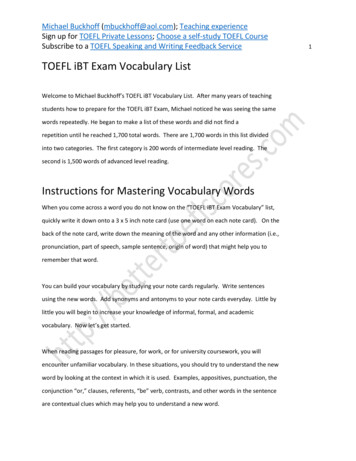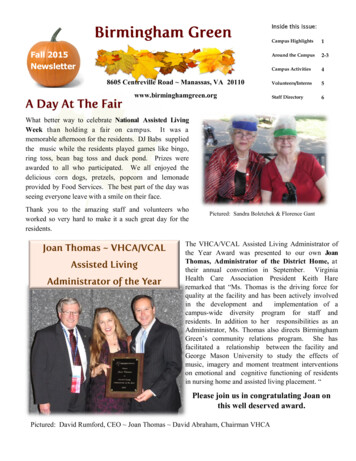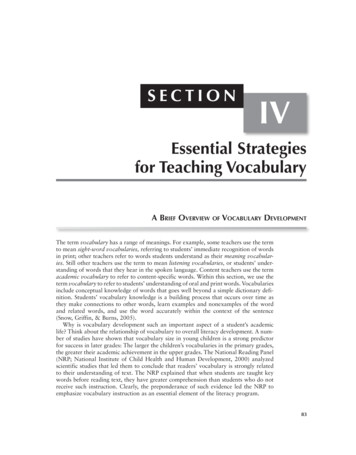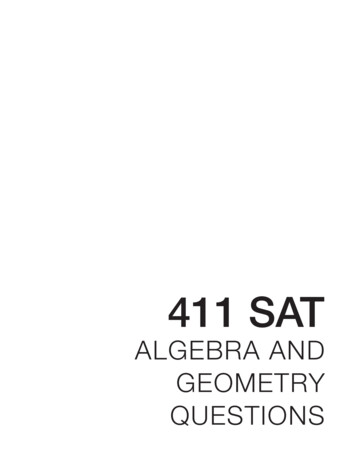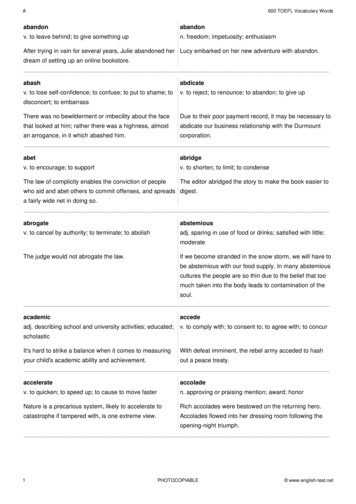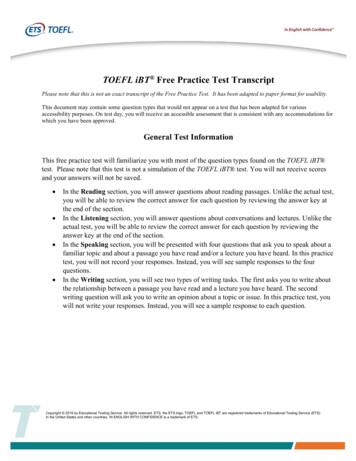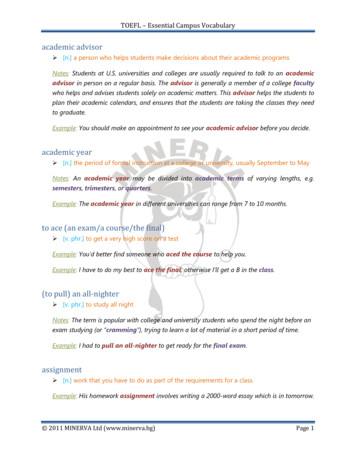
Transcription
TOEFL – Essential Campus Vocabularyacademic advisor [n.] a person who helps students make decisions about their academic programsNotes: Students at U.S. universities and colleges are usually required to talk to an academicadvisor in person on a regular basis. The advisor is generally a member of a college facultywho helps and advises students solely on academic matters. This advisor helps the students toplan their academic calendars, and ensures that the students are taking the classes they needto graduate.Example: You should make an appointment to see your academic advisor before you decide.academic year [n.] the period of formal instruction at a college or university, usually September to MayNotes: An academic year may be divided into academic terms of varying lengths, e.g.semesters, trimesters, or quarters.Example: The academic year in different universities can range from 7 to 10 months.to ace (an exam/a course/the final) [v. phr.] to get a very high score on a testExample: You‟d better find someone who aced the course to help you.Example: I have to do my best to ace the final; otherwise I‟ll get a B in the class.(to pull) an all-nighter [v. phr.] to study all nightNotes: The term is popular with college and university students who spend the night before anexam studying (or “cramming”), trying to learn a lot of material in a short period of time.Example: I had to pull an all-nighter to get ready for the final exam.assignment [n.] work that you have to do as part of the requirements for a classExample: His homework assignment involves writing a 2000-word essay which is in tomorrow. 2011 MINERVA Ltd (www.minerva.bg)Page 1
TOEFL – Essential Campus Vocabularyassistant professor [n.] a college or university teacher who ranks above an instructor / lecturer and belowan associate professorNotes: Assistant professors do not have tenure. An assistant professor who receives tenurebecomes an associate professor.Example: When the professor is ticked off, he sends in his assistant to teach the class.assistantship [n.] an opportunity for a graduate student to teach or do research in exchange for atuition remission or a stipendNotes: Students (usually graduate students) can sometimes apply for an assistantshipthrough part-time academic employment, that is in exchange for teaching or research tasksthey perform for a faculty member, the department, or the college. A graduate teachingassistant (or TA) can typically expect to receive an annual stipend roughly between 6,000and 15,000 as well as free tuition. An assistantship involves many duties andresponsibilities like teaching sections of a course, running laboratory sessions, gradingundergraduate student papers, meeting with students during regular office hours, etc.However, as an assistant you gain valuable experience in and out of the classroom, interactclosely with faculty members in your department, establish yourself and develop crucialworking relationships with your professors which might prove important to your futuresuccess.Example: My roommate got an assistantship from State University.associate professor [n.] a college or university teacher who ranks above an assistant professor and below aprofessorNotes: An assistant professor who receives tenure becomes an associate professor. Anassociate professor may later be appointed a full professor. Assistant professors,associate professors and full professors at American universities perform many duties: theyteach classes, advise students, and carry out research that is published. They also serve onuniversity committees and take part in other activities.Example: Dr. Jacobs is an associate professor now but he is expected to be promoted to a fullprofessor at the end of the year. 2011 MINERVA Ltd (www.minerva.bg)Page 2
TOEFL – Essential Campus Vocabularyto audit a course [v. phr.] to attend a course without taking it for creditNotes: If a student wants to officially register for a class without earning a grade or credit, thecourse may be scheduled as an audit. Regular tuition fees may apply as if the course weretaken for credit but the course does not count towards any degree, certificate, or diploma. Astudent auditing a course may be required to participate fully in the class. Expectationsshould be clarified with the course instructor at the start of the semester but students usuallydo not submit work or sit formal examinations.Example: You should process a registration drop/add form to schedule an audit.to be behind / to get behind [v. phr.] to be late; to have a lot of work to do; to be off scheduleExample: I am behind in my psychology class.Example: I got behind in my math class and now it is really confusing.to bring up your grades [v. phr.] to improve your gradesExample: If you do not bring up your grades, you may not get into graduate school.to call on students [v. phr.] to invite students to speak in classExample: Professors tend to call on students who sit in the front of the room more often thanthose who sit in the back.to call the roll [v. phr.] to read the names of students from a list (roll) in order to take attendanceNotes: A person who calls the roll says each name on the list and waits to hear each personrespond.Example: Everyone, be quiet! I am going to call the roll. 2011 MINERVA Ltd (www.minerva.bg)Page 3
TOEFL – Essential Campus Vocabularycampus [n.] the buildings and grounds of a college or universityNotes: Usually a campus includes libraries, lecture halls, residence halls, and parks.Example: I am going to look into the options for fitness on and off campus.carrel [n.] a private study space in the stacks of the libraryNotes: Usually this is a small desk with high sides meant to partially or completely isolate itsuser from the surroundings. Most of the carrel desks are rectangular in shape and resemblethe cubicle desks popular today but unlike them, carrel desks have no file drawers or otherfacilities. Sometimes the seat is integrated with the carrel desk and some carrel desks haveAC power and Ethernet receptacles for students using laptop computers.Example: I will go to the library early this evening to find a free carrel.cheat [v.] to act dishonestly during an examNotes: Cheating is a serious offence and students who cheat face serious penalties and mayeven be expelled from the university. Even copying a few sentences from a book withoutgiving due credit is considered cheating. At present cheating has reached epidemicproportions. Some of the reasons for cheating are increased competition, the new revolution inhigh-tech digital info and gadgets.Example: I saw a fellow student cheat during the test but I didn‟t report her.to check out books [v. phr.] to borrow books from the libraryNotes: You usually take the material you wish to borrow to a check-out desk. A borrowermust present a university ID or library card and a photo ID to check out books. Your librarycard and a photo ID will be requested also if you want to use Reserve material, the multimediacenter or any material that you need to request from the library staff.Example: You need a library card to be able to check out books. 2011 MINERVA Ltd (www.minerva.bg)Page 4
TOEFL – Essential Campus Vocabularyclass discussion [n. phr.] an exchange of ideas during a classNotes: Some professors tend to turn their lectures into class discussions.Example: I am not ready for the class discussion today.class rank [n.] the number or ratio indicating a student's academic standing in his or her classNotes: A student who ranks first in a class with 100 students will have a class rank of 1/100,and the one ranking last would have 100/100. Sometimes class rank is expressed inpercentiles also.Example: I rank among the top 5% in my class.to be closed out (of classes) [v. phr.] to be denied access to a classExample: You‟d better register tomorrow before you are closed out of the classes you want.coed [adj.] an abbreviation for coeducational – a system of education in which both men andwomen attend the same school or classesExample: My parents do not want me to live in a coed dormitory.college [n.] an undergraduate division of a university or a school within a university which grantsa bachelor’s degreeNotes: In the United States the terms college and university are loosely interchangeable. Auniversity typically has at its core an undergraduate college culminating in a bachelor’sdegree. Universities have, in addition, one or more graduate schools offering a variety ofgraduate programs granting different master’s degrees and doctorates.Example: I need to check the requirements for applying to the college of business at StateUniversity. 2011 MINERVA Ltd (www.minerva.bg)Page 5
TOEFL – Essential Campus Vocabularycommencement [n.] the graduation ceremony at which students receive their degreesNotes: You usually need to wear academic dress (a cap and gown) for commencement.Larger colleges and universities usually have commencement more than once a year. Thedate of graduation if usually referred to as degree day. A commencement speech is a speechgiven to graduating students and their guests by a prominent student or a university alumnus.Universities will often invite a notable figure in the community to be a commencementspeaker and give the commencement speech, including politicians, important citizens, orother noted speakers.Example: George Bush and Bill Clinton attended the University of New Hampshire‟s 2007commencement.committee [n.] a group of professors guiding a graduate student’s programNotes: The committee approves the thesis or dissertation.Example: I am going to meet with my committee today and I hope they will sign mydissertation.counselor [n.] a person who gives students advice, often of a personal natureNotes: You usually see your advisor for academic advice and a counselor for personal advice.Example: Why don‟t you speak with your counselor about the problems with your roommate?course [n.] regularly scheduled class sessionsNotes: You usually pick up a course request form from the registrar‟s office and youracademic advisor usually signs it so that you can register for a course. A degree program ismade up of a specified number of required and elective courses. This varies from institutionto institution.Example: You need to take courses that apply to your major. 2011 MINERVA Ltd (www.minerva.bg)Page 6
TOEFL – Essential Campus Vocabularycram [v.] to study just before a test or an exam, trying to learn a lot of material in a shortperiod of timeNotes: Cramming for tests is less effective than studying far in advance and revising properlywhen the exam approaches. However, cramming in the last remaining minutes is a tacticpreferred by many students worldwide. Key pieces of information, like formulas andfundamental aspects, are known as crammables.Example: I have poor time management skills and last night I again had to cram for today‟sbiology final.Example: You need to be more organized so you will not have to cram for your tests.credit [n.] a unit of study; part of a college or university course that you have completedsuccessfullyNotes: A student earns credits for the successful completion of each course for each academicterm (semester/trimester/quarter). The state or the institution generally sets a minimumnumber of credits required to graduate. Different systems of credits exist: one per course, oneper hour/week in class, one per hour/week devoted to the course (including homework), etc.Example: I have to take thirty more credits toward my master’s degree.Example: This course counts as one credit towards your degree.credit hour [n.] the number that represents one hour of class per week for one termNotes: To calculate a grade point average (GPA), the grade received in each course isweighted by multiplying it by the number of credit hours. Thus, a "B" (three grade points) ina four-credit class gives 12 "quality points", which are added together, then divided by thetotal number of credits a student has taken, to get the GPA.Notes: Credit hours are also known as course credits or simply credits.Example: This course is three credit hours. 2011 MINERVA Ltd (www.minerva.bg)Page 7
TOEFL – Essential Campus Vocabularycurve [n.] a grading system based on the normal curve of distribution so that there are a fewA grades, the majority are C grades and there are a few failing gradesNotes: The term curve refers to the “bell curve” – the graphical representation of theprobability density of the normal distribution. It is generally believed that grading on thecurve encourages competition. It is also used to compensate for testing error or to control thedistribution of grades. Grades are awarded as performance is compared to all otherindividuals rather than to an absolute standard.Example: The exam was graded on the curve so my score of 95 resulted in a B.to cut class / to skip class / to miss class [v. phr.] to be absent from class, often without having a good excuseExample: I can‟t believe you cut class on Thursday to sleep in, with all those absences that youhave!dean [n.] an administrator who ranks above a department chair and below a vice presidentNotes: A dean is usually the head of a significant collection of departments within auniversity (e.g., “dean of the college of art and sciences” or “dean of the school of medicine”).A dean usually approves faculty hiring, sets academic policies, controls the budget, and doesother administrative duties.Example: I think you should meet with the dean about your problem.dean’s list [n. phr.] the honor roll at a college or universityNotes: The GPA requirements for qualifying for the dean’s list vary from institution toinstitution. Generally, using the GPA scale from 0-4, 4 being an A, students who maintain a3.5 grade point average are included on the dean’s list.Example: I had to improve my grades substantially but I finally made the dean’s list lastsemester. 2011 MINERVA Ltd (www.minerva.bg
TOEFL – Essential Campus Vocabulary 2011 MINERVA Ltd (www.minerva.bg) Page 5 class discussion [n. phr.] an exchange of ideas during a class


